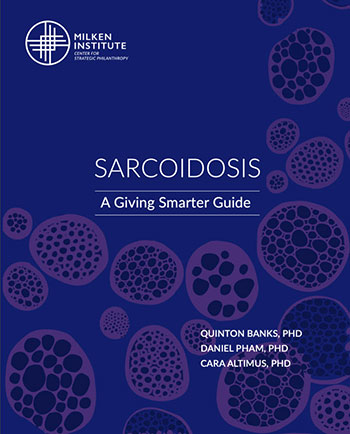Antje Prasse , MD, University Hospital Basel
Co-Investigator: Theresa Graalmann, MD, PhD, Twincore
This project intends to study the role of the C-type lectin receptor (CLR) in granuloma formation, a key feature of sarcoidosis pathogenesis. The research team aims to investigate how a specific CLR, Mincle, affects granuloma formation. They also plan to use novel nanotechnologies as a tool to specifically target CLRs involved in granuloma formation. These nanotechnologies might be a tool that could deliver therapeutics to the problematic cells in patients with sarcoidosis.
Michael Levy, MD, PhD, Mass General Brigham
Co-Investigator: Shamik Bhattacharrya, MD, Brigham and Women’s Hospital
This project seeks to understand the pathogenesis of neurosarcoidosis—sarcoidosis of the brain—by studying exosomes, which are small biological containers that transport proteins and other molecules. To begin profiling exosomes, Dr. Levy’s team will obtain cerebrospinal fluid from neurosarcoidosis patients and controls and study the differences in protein and gene expression within exosomes between the groups. Neurosarcoidosis is especially challenging, but this study could help find biomarkers and pharmacological targets.
Nabeel Hamzeh, MD, University of Iowa
Co-Investigator: Karin Hoth, PhD, University of Iowa
This project seeks to be the first to use neuroimaging approaches and assessments of disease burden to interrogate changes in brain activity and structure within patients with systemic sarcoidosis but without neurosarcoidosis. The team hypothesizes that systemic inflammation can lead to changes in brain metabolism, manifesting as impaired cognitive function. This project could offer insights on how sarcoidosis affects cognition.
Sean Agbor-Enoh, MD, PhD, National Heart, Lung, and Blood Institute
Co-Investigators:
- Mary Richert, MD, National Heart, Lung, and Blood Institute
- Steve Holland, MD, National Institute of Allergy and Infectious Diseases
- Wonder Drake, MD, University of Maryland, Baltimore
- Edward Chen, MD, Johns Hopkins University
- Shambhu Arya, MD, Inova Fairfax
This project intends to test the utility of cell-free DNA to diagnose, identify organ involvement, assess disease severity, and monitor treatment responses and progression in sarcoidosis. The team will also form a research working group to monitor outcomes from this study and plan future studies with the recruited patient cohort.
Wei Shi, MD, PhD, University of Cincinnati
Co-Investigator: Nishant Gupta, MD, University of Cincinnati
This project will investigate the role of lysosomes, which play a central role in a cell’s ability to break down waste, in sarcoidosis. This team aims to determine how lysosomal dysregulation contributes to sarcoidosis in patients and whether an existing drug can alleviate sarcoidosis-like symptoms in mice. These studies will help investigators assess the potential of lysosomal activity to serve as a prognostic biomarker and could potentially identify a drug that could be repurposed for sarcoidosis treatment while enabling an increased understanding of sarcoidosis biology.


